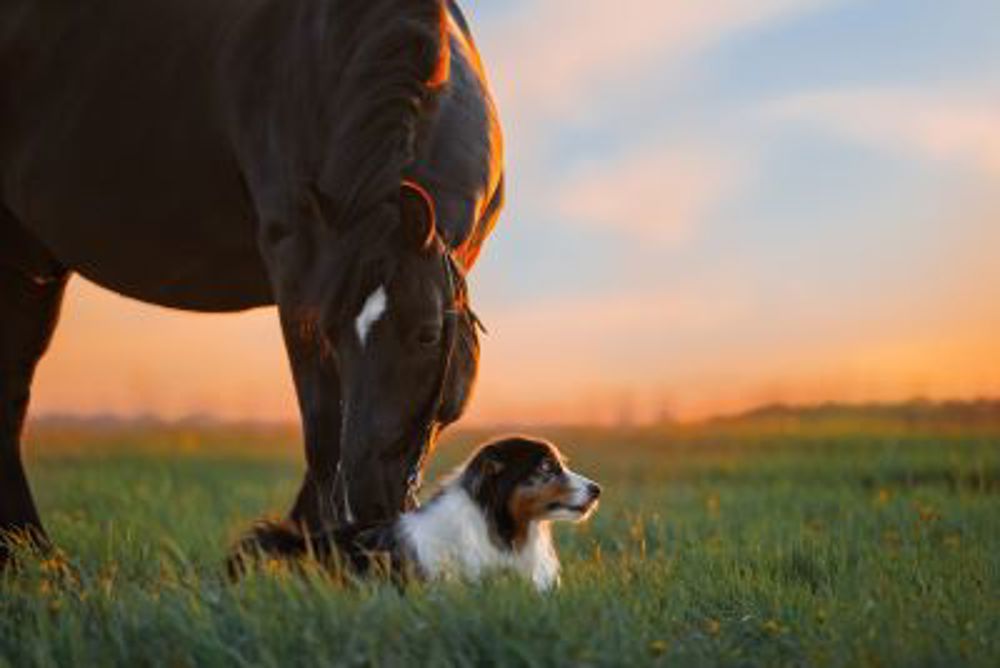
Top tips to stay safe around horses
- When passing a ridden or driven horse, stay in sight and keep your dog calm, at your side, and on a short lead
- Keep your dog on a lead near grazing horses but release them if threatened or chased, so you can get to safety separately
- Prevent your dog from approaching any horse, unless the rider or owner says it’s OK
- Remember you can encounter horses wherever you are in town, coast and countryside. Look out for hoof prints and be prepared to say hello and share the outdoors
- Train your dog to be calm and controlled around horses, farm animals and other people – The Good Citizen Dog Training scheme can help
- Always keep your dog in sight and under control. Only let your dog off lead when you're confident they will return on command
- Make sure your dog does not stray from the path or area where you have a right or permission to be
Dogs and horses in the outdoors
Since the 18th century, Dalmatians were taught to run alongside horse-drawn carriages to keep passengers safe, and to this day Australian Shepherd dogs help ranchers move horses and cattle across the American plains.
Such impressive steadiness and control is built on daily exposure and training around horses from being a puppy. Most dogs don’t get that training and so can react unpredictably to horses by wanting to play, chase, bark or run away, all of which can have fatal consequences and result in you being fined and getting a criminal record.
While you are most likely to meet horses being ridden on bridleways or grazing when you walk through fields, in truth you need to keep an eye out for horses all the time. It’s not uncommon for horses to be ridden along beaches, common land, moorland and downland, plus there are many routes that riders can lawfully use that are not apparent on maps or signposts. And in Scotland almost all routes that are open to walkers are also open to horse riders too, due to the public’s wide-ranging access rights.
Remember that riders often have no choice but to use roads where some drivers pass them too close and at speed, and so being started or chased by a dog is even more likely to end in tragedy. Even if your dog is calm, unexpectedly seeing your pet can startle a horse, especially in areas where dogs are not usually seen.
Learn more about how and why horses can react to your dog, from this advice from The British Horse Society.
Serious injuries do happen
While many incidents go unrecorded, 2,579 dog-related incidents have been reported to The British Horse Society since 2010; these included deaths of 28 horses and 3 people, along with injuries to 684 horses and 702 people. Dogs are also at risk of being killed or injured from being kicked or trampled.
Apart from the physical risks to you and your dog from an uncontrolled encounter with a horse, you may also have broken one of the many UK-wide laws designed to keep people and animals safe. If found guilty you could be fined, get a criminal record and your dog could be destroyed.
If your dog causes injury or death to a horse or rider you could also be sued for compensation. This is why it’s vital to have third-party liability insurance, which is included in Kennel Club Pet Insurance policies. *
Getting your dog used to horses
You can learn life skills to keep your dog safe and happy in the outdoors, such as a reliable recall and loose lead walking, at the 1,700 Kennel Club Good Citizen Training Scheme centres across the UK. Some training clubs also organise events where you can introduce your dog to horses in a safe, controlled environment, with expert trainers on hand. Find out more about our Good Citizen Dog Training scheme.
Even if there are no training events near you, there are lots of opportunities to gradually expose puppies and adult dogs to horses in a controlled way. Over the summer, there are many country fairs where you can take your dog and see horses being shown and ridden. Many dog agility clubs train at indoor riding arenas, which offer a great opportunity to teach your dog to be calm around horses and learn about agility too.
There’s also more training advice and a video from The British Horse Society.
* The Royal Kennel Club Limited is an Appointed Representative of Agria Pet Insurance Ltd who administer the insurance and is authorised and regulated by the Financial Conduct Authority, Financial Services Register Number 496160. Agria Pet Insurance is registered and incorporated in England and Wales with registered number 04258783. Registered office: First Floor, Blue Leanie, Walton Street, Aylesbury, Buckinghamshire, HP21 7QW. Agria insurance policies are underwritten by Agria Försäkring who is authorised and regulated by the Prudential Regulation Authority and Financial Conduct Authority.
